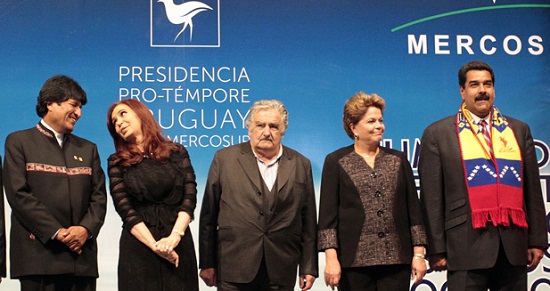While Left Governments in South America Face Setbacks, Gains of Progressive Period Likely to Endure
LATIN AMERICA AND THE CARIBBEAN, 14 Dec 2015
Benjamin Dangl, Upside Down World – TRANSCEND Media Service
 (L-R) Presidents Evo Morales of Bolivia, Cristina Fernandez of Argentina, Jose Mujica of Uruguay, Dilma Rousseff of Brazil and Nicolas Maduro of Venezuela. 2013 Mercosur. 7 Dec 2015 – It’s hard to tell before the dust settles, and the situation in each country is unique, but it’s very likely that 2015 will be viewed as a critical year for leftist governments in South America. Chavismo took a blow yesterday in the country’s Parliamentary elections, the right won the presidential elections in Argentina a couple of weeks ago, Ecuador’s Correa recently announced he would not seek re-election in 2017, impeachment proceedings are moving forward against the Workers’ Party President Rousseff in Brazil, and Evo Morales’ MAS party lost regional elections in March. In general terms, and aside from debates about how progressive each of these governments are, the defeats point to clearer political fault lines in the region. It could be described, as many have, as the end of a progressive cycle, or the receding waves of the pink tide. But the goal of many of these administrations, and their champions and beneficiaries, was to create economic, political and social changes that would outlast electoral defeats. From Venezuela to Argentina, generations have been impacted by the social programs, rights, regional solidarity, and empowering politics of these administrations. The political experience of living under these governments has shaped progressive ideology and imagination that will survive presidents. In addition, while politics might change above, social movements have been organizing all of these years in ways that aren’t defined wholly by party power, but by autonomous relations strengthened from below, in urban peripheries, for women’s rights, and in the various struggles against extractivism. All of this means that the gains of South America’s progressive period, won in the halls of power and in the streets, won’t likely be swept aside anytime soon. _______________________________________ Benjamin Dangl is the author of Dancing with Dynamite: Social Movements and States in Latin America, and is a doctoral candidate in Latin American history at McGill University. |
Go to Original – upsidedownworld.org
DISCLAIMER: The statements, views and opinions expressed in pieces republished here are solely those of the authors and do not necessarily represent those of TMS. In accordance with title 17 U.S.C. section 107, this material is distributed without profit to those who have expressed a prior interest in receiving the included information for research and educational purposes. TMS has no affiliation whatsoever with the originator of this article nor is TMS endorsed or sponsored by the originator. “GO TO ORIGINAL” links are provided as a convenience to our readers and allow for verification of authenticity. However, as originating pages are often updated by their originating host sites, the versions posted may not match the versions our readers view when clicking the “GO TO ORIGINAL” links. This site contains copyrighted material the use of which has not always been specifically authorized by the copyright owner. We are making such material available in our efforts to advance understanding of environmental, political, human rights, economic, democracy, scientific, and social justice issues, etc. We believe this constitutes a ‘fair use’ of any such copyrighted material as provided for in section 107 of the US Copyright Law. In accordance with Title 17 U.S.C. Section 107, the material on this site is distributed without profit to those who have expressed a prior interest in receiving the included information for research and educational purposes. For more information go to: http://www.law.cornell.edu/uscode/17/107.shtml. If you wish to use copyrighted material from this site for purposes of your own that go beyond ‘fair use’, you must obtain permission from the copyright owner.
Read more
Click here to go to the current weekly digest or pick another article:
LATIN AMERICA AND THE CARIBBEAN: